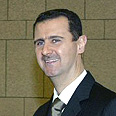
Talk to Assad
צילום: AFP
World is against us, as usual
Our leaders' tendency to focus on threats leads to missed opportunities
In the framework of the regular annual ritual, we saw the publication of the yearly intelligence assessment. Unsurprisingly, this assessment is starker and more threatening than the one that came before it. Iran? Approaching the production of nuclear weapons. Hamas? Preparing for escalation. Syria? Looking for revenge for the attack on its reactor and Mugniyah killing, and its missiles cover Israel's entire territory. Israeli Arabs? Increasingly radicalizing.
The bottom line: We are threatened by terrible dangers on all fronts. Only the West is not aiming missiles at us for the time being.
The reactions to the intelligence assessment have also become part of a regular ritual. Ministers are sent to television studios in order to explain how worrisome the situation is; senior officers submit proposals for boosting the defense budget; rightist speakers issue announcements urging the government to take action (military action of course, what else?)
Our intelligence bodies are very strict about identifying dangers and describing them as an understandable lesson from the Yom Kippur War trauma, and for good reason. Israel indeed faces a harsh geopolitical reality and genuine threats. Yet what should we do about them? Is greater panic the recipe for addressing the threats or is it a recipe for taking advantage of the dangers in order to advance a one-dimensional security agenda?
Had we invested a small part of the energy directed to identifying and describing dangers to identifying and describing opportunities, things would look a little different. We are all familiar with the rockets threatening Sderot and Gaza-region residents. There is no need for further descriptions. Yet the calm that lasted a few days, until the IDF's assassination operation in Bethlehem, proved that the lull also has a chance, even through indirect dialogue.
The polls show that the majority of the public backs a ceasefire with Hamas and realizes that this is an opportunity for a temporary solution at least, yet interested political elements are determined to prove that force and more forces are the only required response for the threat. It is regrettable that the foreign minister of all people, who is supposed to be the one to advance a diplomatic alternative, was so quick to adopt an inflexible stance in this case.
Distorted picture
The Syrian president repeatedly says in interviews to international media outlets that he is interested in open negotiations with the State of Israel. Doesn't this opportunity sound more promising, in the face of the Syrian missile deployment, than another war with Damascus? And while intelligence and army officials appear in every opportunity in order to describe the Syrian threat, there is no official body that would present credible and to-the-point information regarding Syria's aspirations for peace.
One need not be a professor of strategy in order to realize that removing Syria from the cycle of war against Israel and disconnecting the passage from Iran to Hizbullah would dramatically improve Israel's condition on the northern border, and in fact serve to break up the fundamentalist axis threatening Israel. However, the various strategists know how to describe the threats of a growing Hizbullah while ignoring the possibility of weakening it through such a diplomatic move.
Abba Eban once said that the Palestinians never miss an opportunity to miss an opportunity. Yet the conditioned reflex of Israel's security and political leaders to focus time and again on strategic threats and blatantly ignore diplomatic opportunities leads us down the same path.
Strategic intelligence assessments are important, but they must be accompanied by a relevant discussion of the strategic opportunities faced by the State of Israel in a manner that would enable us to take advantage of them in order to improve our diplomatic-security reality. Bodies that only describe threats and hide opportunities from the public are not doing their job, are presenting the public with a distorted picture, and do not allow it to take rational decisions regarding the appropriate path to be taken by the state.
The prime minister should meet the challenge presented by the Syrian president and invite him to engage in direct talks. This is the proper and required response if we wish to address the security challenges posed by the strategic assessment – so that after the next war, you won't say that nobody told you.
Gavri Bargil is the Kibbutz Movement's secretary general










